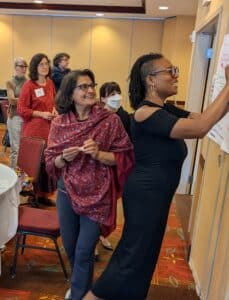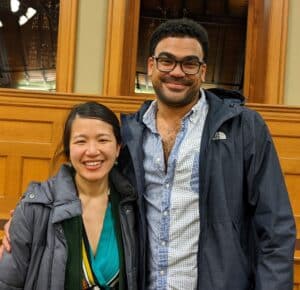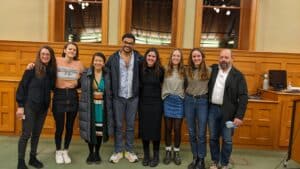The Great Lakes Colleges Association is pleased to announce the winners of the 2023 GLCA New Writers Award for Poetry, Fiction, and Creative Non-fiction. Since 1970, the New Writers Award confers recognition on promising writers who have published a first volume in one of the three genres. Judges of the New Writers Award are faculty members of creative writing and literature at GLCA’s member colleges. Winning writers receive invitations to visit GLCA member colleges, where they give readings, meet with students and faculty members, and discuss technique and creativity in the writing process.
The 2023 winner for Poetry is James Fujinami Moore, indecent hours, published by Four Way Books. Our GLCA judges note:
indecent hours is a brilliant debut collection by a poet who isn’t afraid to be both flawed and vulnerable. Fujinami Moore’s poems are suffused with a timely and timeless quality as they address the fraught contemporary social fabric of American life, especially as experienced by an Asian-American person, “Maybe I am like Bruce Lee. I form the shape of what I am given,” and reflect on the fundamental experiences of being human. In one instant he’s lulling us into submission with a surrealist’s touch and in another, snapping us into sobering wakefulness with uncharacteristic lucidity. This poet is a showoff but, then, can you blame him? He can be both smart and disturbingly funny, “The fish was immortal, I think” within the same line. The poet reminds us that “we must do our part to fight the stereotype.” The problem is that they are everywhere. Free verse, elegy, epistolary, and structural experimentation offer a variety of modes for the poet to traverse encounters with others, place and environment, and the self. There’s beauty in this economic language that keeps me reading for more. indecent hours is a gorgeous construction of the American narrative that celebrates and abhors our history of violence and questions the joys and terrors we enact as humans.
Judges of the Poetry Award were:
Chanda Feldman, Oberlin College
Eugene Gloria, DePauw University
Tim Lake, Wabash College
The 2023 winner for Fiction is Tsering Yangzom Lama, We Measure the Earth with Our Bodies published by Bloomsbury Publishing. Our GLCA judges note:
Lama’s beautifully-crafted multigenerational novel asks what it means to lose and try to reclaim one’s cultural inheritance. As children, Tibetan sisters Lhamo and Tenkyi lose nearly everything when they flee Western Tibet and wind up in a refugee camp in Nepal. Later, Lhamo’s daughter, Dolma, and her sister Tenkyi make it to Canada, but remain bereft. This novel traces a remarkable scope of time, geography, and culture, as Lama writes through the exile of Nepalese after Communist occupation. Like the Nameless Saint—a sacred relic worshipped by the sisters’ exiled Tibetan community that is repeatedly stolen and reclaimed—they too are condemned to dislocation, yearning for their homeland and inheritance that have been lost and destroyed. Oracles, and icons, and sisters connect as a way to share the history of a place and tell stories that must be shared to keep alive a vital part of cultural connection which is not so much historical but, instead, current and vibrant because these very stories are shared. The novel speaks to the often forgotten tragedy of Tibet and focuses on individual and cultural trauma that follows over an ocean and into the lives of people who know only of loss. It sheds new light on important questions of colonialism, exile, and cultural identity. The management of time and characters make this book a stunning read.
Judges of the Fiction Award were:
Margot Singer, Denison University
Matthew Ferrence, Allegheny College
Ira Sukrungruang, Kenyon College
The 2023 winner for Creative Non-Fiction is Lars Horn, Voice of the Fish: A Lyric Essay, published by Graywolf Press. Our GLCA judges note:
Lars Horn’s Voice of the Fish: A Lyric Essay is compelling and uniformly beautiful on every page; it charts a poet’s attention to detail. A slippery, enigmatic thing—a thoughtful and imaginative rumination on the human body, art, illness, and family. Horn’s prose questions delicate ideas of performance and exhibition and is impressively inquisitive, lyric and rhapsodic. What a marriage of form to content! Horn uses a sustained water metaphor to “float” questions of trans identity as they relate to the larger human quest to net meaning in a sea of indeterminacy. Voice of the Fish offers a strangely subtle erudition. From the faulty eyesight of Greenland sharks to the Graeco-Roman distinction between branding and tattooing, the range of information here never calls attention to itself, never makes a show of knowing. It all fits. The vignettes pace the reader, gathering momentum like a current getting stronger. A mesmerizing debut.
Judges of the Creative Non-Fiction Award were:
Nels Christensen, Albion College
Amy Butcher, Ohio Wesleyan University
Rhoda Janzen, Hope College
For more information on the New Writers Award, please contact Colleen Monahan Smith, ([email protected]) at the GLCA.


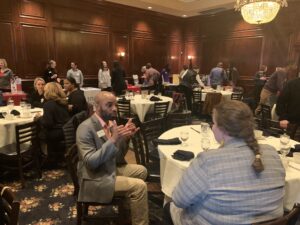 At each of the two February events, held in Chicago and nearby Schaumburg, counselors gathered for breakfast and informal conversation with admissions officers from among the 27 collective small liberal arts colleges of the GLCA and ACM. Each day, two panels of professional admission and financial aid staff from the consortia spoke on general admissions topics and financial aid. Each event concluded with a college fair providing one-on-one conversations between high school counselors and admission staff.
At each of the two February events, held in Chicago and nearby Schaumburg, counselors gathered for breakfast and informal conversation with admissions officers from among the 27 collective small liberal arts colleges of the GLCA and ACM. Each day, two panels of professional admission and financial aid staff from the consortia spoke on general admissions topics and financial aid. Each event concluded with a college fair providing one-on-one conversations between high school counselors and admission staff.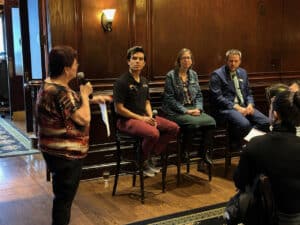 The panels covered pertinent topics including the benefits of attending a small residential liberal arts college, such as the individual attention students receive, a topic of particular importance as mental health concerns have risen on campuses following COVID-19.
The panels covered pertinent topics including the benefits of attending a small residential liberal arts college, such as the individual attention students receive, a topic of particular importance as mental health concerns have risen on campuses following COVID-19.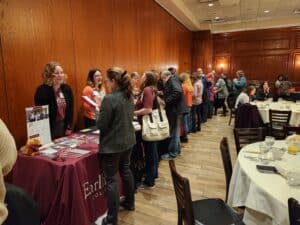 “After a successful pivot to virtual activities during the pandemic, these breakfasts were the Midwest College Showcase’s first foray back into in-person gatherings. We tailored the program to cover topics that were of most interest to counselors and their students, and we are thrilled that so many counselors joined us. We will be adding more information on the topics covered to the Midwest College Showcase
“After a successful pivot to virtual activities during the pandemic, these breakfasts were the Midwest College Showcase’s first foray back into in-person gatherings. We tailored the program to cover topics that were of most interest to counselors and their students, and we are thrilled that so many counselors joined us. We will be adding more information on the topics covered to the Midwest College Showcase 